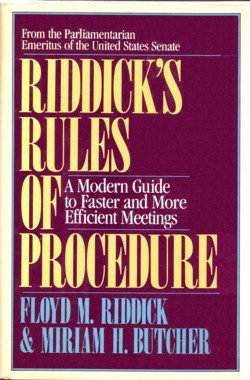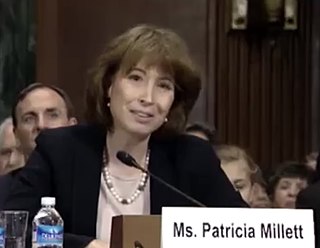
The positions of majority leader and minority leader are held by two United States senators and members of the party leadership of the United States Senate. They serve as the chief spokespersons for their respective political parties holding the majority and the minority in the United States Senate. They are each elected as majority leader and minority leader by the senators of their party caucuses: the Senate Democratic Caucus and the Senate Republican Conference.

Cloture, closure or, informally, a guillotine, is a motion or process in parliamentary procedure aimed at bringing debate to a quick end. The cloture procedure originated in the French National Assembly, from which the name is taken. Clôture is French for "the act of terminating something". It was introduced into the Parliament of the United Kingdom by William Ewart Gladstone to overcome the obstructionism of the Irish Parliamentary Party and was made permanent in 1887. It was subsequently adopted by the United States Senate and other legislatures. The name cloture remains in the United States; in Commonwealth countries it is usually closure or, informally, guillotine; in the United Kingdom closure and guillotine are distinct motions.
In parliamentary procedure, a point of order occurs when someone draws attention to a rules violation in a meeting of a deliberative assembly.
Contempt of Congress is the act of obstructing the work of the United States Congress or one of its committees. Historically, the bribery of a U.S. senator or U.S. representative was considered contempt of Congress. In modern times, contempt of Congress has generally applied to the refusal to comply with a subpoena issued by a congressional committee or subcommittee—usually seeking to compel either testimony or the production of requested documents.
Budget reconciliation is a special parliamentary procedure of the United States Congress set up to expedite the passage of certain budgetary legislation in the Senate. The procedure overrides the Senate's filibuster rules, which may otherwise require a 60-vote supermajority for passage. Bills described as reconciliation bills can pass the Senate by a simple majority of 51 votes or 50 votes plus the vice president's as the tie-breaker. The reconciliation procedure also applies to the House of Representatives, but it has minor significance there, as the rules of the House of Representatives do not have a de facto supermajority requirement. Due to greater polarization, gridlock, and filibustering in the Senate in recent years, budget reconciliation has come to play an important role in how the United States Congress legislates.
In the United States Senate, the nuclear option is a parliamentary procedure that allows the Senate to override a standing rule by a simple majority, avoiding the two-thirds supermajority normally required to invoke cloture on a resolution to amend the Standing Rules. The term "nuclear option" is an analogy to nuclear weapons being the most extreme option in warfare.
A parliamentary authority is a book of rules for conducting business in deliberative assemblies. Several different books have been used by legislative assemblies and by organizations' deliberative bodies.

A conference committee is a joint committee of the United States Congress appointed by the House of Representatives and Senate to resolve disagreements on a particular bill. A conference committee is usually composed of senior members of the standing committees of each house that originally considered the legislation.
The parliamentarian of the United States House of Representatives manages, supervises, and administers the Office of the Parliamentarian, which is responsible for advising the House's presiding officers, members, and staff on procedural questions under the U.S. Constitution and House rules and precedents, as well as for preparing, compiling, and publishing the precedents of the House.

The parliamentarian of the United States Senate is the official advisor to the United States Senate on the interpretation of Standing Rules of the United States Senate and parliamentary procedure. Incumbent parliamentarian Elizabeth MacDonough has held the office since 2012, appointed by then-Senate majority leader Harry Reid.
The presiding officer of the United States Senate is the person who presides over the United States Senate and is charged with maintaining order and decorum, recognizing members to speak, and interpreting the Senate's rules, practices, and precedents. Senate presiding officer is a role, not an actual office. The actual role is usually performed by one of three officials: the vice president of the United States; an elected United States senator; or, under certain circumstances, the chief justice of the United States. Outside the constitutionally mandated roles, the actual appointment of a person to do the job of presiding over the Senate as a body is governed by Rule I of the Standing Rules.

Floyd Millard Riddick was a Parliamentarian of the United States Senate from 1964 to 1974, and is most famous for developing Riddick's Senate procedure. He sat immediately below the presiding officer in the Senate chamber, providing information on precedents and advising other senators on parliamentary procedure. He is famous for discussions of the censures of Joseph McCarthy and Thomas Dodd, the contested election between John A. Durkin and Louis Wyman, and the preparations for a planned impeachment trial of Richard Nixon. He is also famous for advocating the change in the rules of cloture.
In the United States, a parliamentarian is an expert on parliamentary procedure who advises organizations and deliberative assemblies. This sense of the term "parliamentarian" is distinct from the usage in parliamentary republics and monarchies as a synonym for member of parliament.
Debate in parliamentary procedure refers to discussion on the merits of a pending question; that is, whether it should or should not be agreed to. It is also commonly referred to as "discussion".

Riddick's Rules of Procedure is a parliamentary authority - a book explaining the parliamentary procedure, including the rules, ethics, and customs governing meetings and other operations of the United States Senate. It was written by Floyd M. Riddick and co-authored by Miriam Butcher. The book is based on Riddick's experience as parliamentarian of the Senate as well as the procedures of assemblies using parliamentary manuals such as Robert's Rules of Order, and is arranged in a glossary style.

Patricia Ann Millett is a United States circuit judge of the United States Court of Appeals for the District of Columbia Circuit. She formerly headed the Supreme Court practice at the law firm Akin Gump Strauss Hauer & Feld. Millett also was a longtime former assistant to the United States Solicitor General and served as an occasional blogger for SCOTUSblog. At the time of her confirmation to the D.C. Circuit, she had argued 32 cases before the United States Supreme Court. In February 2016 The New York Times identified her as a potential nominee to replace Justice Antonin Scalia.

The United States Senate is the upper chamber of the United States Congress, with the House of Representatives being the lower chamber. Together they compose the national bicameral legislature of the United States.
A filibuster is a tactic used in the United States Senate to delay or block a vote on a measure by preventing debate on it from ending. The Senate's rules place few restrictions on debate; in general, if no other senator is speaking, a senator who seeks recognition is entitled to speak for as long as they wish. Only when debate concludes can the measure be put to a vote.

In the United States, a federal impeachment trial is held as the second stage of the United States federal government's bifurcated (two-stage) impeachment process. The preceding stage is the "impeachment" itself, held by a vote in the United States House of Representatives. Federal impeachment trials are held in the United States Senate, with the senators acting as the jurors. At the end of a completed impeachment trial, the U.S. Senate delivers a verdict. A "guilty" verdict has the effect of immediately removing an officeholder from office. After, and only after, a "guilty" verdict, the Senate has the option of additionally barring the official from ever holding federal office again, which can be done by a simple-majority vote.

In the United States, federal impeachment is the process by which the House of Representatives charges the president, vice president, or a civil federal officer for alleged misconduct. The House can impeach an individual with a simple majority of the present members or other criteria adopted by the House according to Article One, Section 2, Clause 5 of the U.S. Constitution. Similarly, state and territorial officials, such as a governor, can be impeached and tried by their respective legislatures according to their constitutions. In Washington, D.C., elected officials, except the District's delegate to the Congress, are removed in a recall election instead of through an impeachment process.









